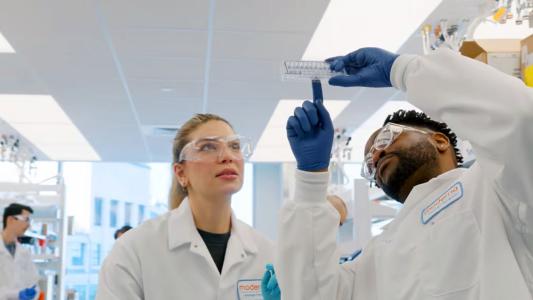UK scientists have used cows’ milk to deliver RNA therapies in an experiment with rats. It’s the first step towards a breakthrough that may fundamentally change how people take medicine.
RNA therapies: Most of your genes contain instructions to make proteins. These instructions are written in DNA, but it’s the job of another type of molecule, RNA, to translate those instructions and help cells make the proteins they need.
We can take advantage of this natural mechanism with RNA therapies, which can tell cells to make helpful proteins (or not make harmful ones) in order to treat diseases. The mRNA vaccines for COVID-19, for example, instruct cells to make the coronavirus’ spike protein in order to trigger an immune response that protects against the real virus.
“The ability to deliver ‘biological’ drugs, such as RNA therapies, is often regarded as the ‘holy grail’ of drug delivery.”
Driton Vllasaliu
RNA therapies have the potential to address countless health problems, from cancers to neurodegenerative disorders, but because RNA degrades easily, it’s hard to administer as a drug.
Currently, the only option is to package RNA in protective nanoparticles, but those can also trigger the immune system in their own right, leading to unpleasant side effects. The RNA then also has to be administered via an injection — even with its protective particle, our stomach acid would degrade the RNA if we tried to take it orally, preventing it from ever being taken up and used by our body.
“Oral administration of drugs is the most acceptable, convenient, and usually the cheapest way to take medicines as it doesn’t rely on healthcare professionals,” said Driton Vllasaliu, a senior lecturer in pharmaceutics at King’s College London (KCL). “The ability to deliver ‘biological’ drugs, such as RNA therapies, is often regarded as the ‘holy grail’ of drug delivery but has remained a stubborn challenge.”
Does a body good: Vllasaliu thinks cows could be key to overcoming RNA therapies’ delivery limitations.
For a new study published in the Journal of Nanobiotechnology, his team describes using extracellular vesicles (EVs) — a type of particle that cells use to shuttle proteins, fats, and more to other cells — as delivery vehicles for RNA.
They aren’t the first to explore the use of EVs to deliver RNA therapies, but they are one of the first to source them from cows’ milk. Because people are already regularly exposed to milk EVs, the particles are unlikely to trigger an unwanted immune response, according to the researchers, and they should be safe for people to consume in RNA therapies.
“Solving the challenge of drug loading into milk EVs could lead to disruptive and affordable oral biological therapies for many diseases.”
Driton Vllasaliu
For their study, the KCL team extracted EVs from cows’ milk and then loaded them with RNA molecules to treat inflammatory bowel disease (IBD). When administered orally to rat models of IBD, the therapy reduced the rodents’ IBD-related inflammation. The team believes this is the first in vivo demonstration of EVs from cows’ milk being used to deliver an RNA therapy.
The milk EVs were also able to cross the gut barrier in lab models of human intestines, which suggests they could deliver RNA therapies to the bloodstream. If confirmed with future research, that would indicate that the approach could be used to treat conditions beyond the digestive system.
“This study is significant as it suggests oral delivery of RNA drugs using technology based on milk EVs may be possible,” said Vllasaliu.
Looking ahead: In February 2024, Vllasaliu was awarded a £1.4 million ($1.7 million) grant to continue studying the use of milk EVs to deliver RNA therapies.
“This project will tackle the current major challenge of effectively loading large molecule drugs, such as RNA therapies, into these EVs,” he told Freethink. “Solving the challenge of drug loading into milk EVs could lead to disruptive and affordable oral biological therapies for many diseases.”
We’d love to hear from you! If you have a comment about this article or if you have a tip for a future Freethink story, please email us at [email protected].






